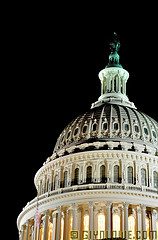
A real government shutdown, if it happens, will fundamentally undermine the conservative narrative in ways that could be profound and lasting for the right wing.
Central to the conservative case is the idea that the federal government is both ill-suited and ineffective at addressing our nation’s social challenges.
Military defense and protection of property, the story goes, are core and appropriate federal functions. But when it comes to fostering economic security and prosperity, improving education for a global economy, making healthcare accessible, or protecting equal opportunity, government’s only proper role is to stand down. An ancillary conservative tenet is that today’s federal government is bloated, wasteful, and useless, throwing good money after bad and doing nothing of value for everyday working people.
What keeps those arguments credible for many middle-of-the-road Americans is that some of the most widely valued aspects of the federal government’s role are invisible or, at least, deep in the background.
Just as a fish doesn’t notice that it’s wet, most Americans easily forget about—or have never really considered—the public structures that keep us safe, connect us as a successful nation, and support the ladder of opportunity. Thus, ask most Americans what the federal government does with their tax dollars, and you get responses ranging from blank stares and eye rolling to “damned if I know,” to “out of control spending, fraud and abuse.” Asked that way, the question, unleashes the dominant, mostly conservative, narrative.
The Invisible Would Become Visible
But when you ask most Americans if they've benefited from public structures and innovations like Social Security, Medicare, the interstate highway system or the Internet, the conversation begins to change. When the question probes their support for air traffic control, food and drug inspections, or consumer protections, a positive consensus emerges. And when asked whether initiatives like the GI Bill, Pell grants, Headstart, or HUD’s first-time homebuyer assistance have ever helped their families move forward, tens of millions reply in the affirmative.
Similarly, a real shutdown, if it happens, would pose the question in a way that reveals the fallacy of the conservative rap on government.
Just as super-storm Sandy's rampage ahead of the 2012 election crippled Mitt Romney's call for government to “just get out of the way,” a true shutdown would suddenly propel the federal government’s positive role from the background to the foreground, fundamentally undermining the conservative case. Paradoxically, if popular and often life-saving programs and services ground to a halt, the invisible would suddenly become visible by virtue of its absence.
This would not come to pass immediately, and for good reason. Prudent Executive Branch practices seek to protect the American people for as long as possible from the harshest and most dangerous implications of a politically-motivated shutdown. For weeks after the government technically “shuts down,” for example, it would continue to pay Social Security benefits and make Medicare and Medicaid reimbursements. Federal employees deemed “essential”—including members of the military, air traffic controllers, the FBI and the TSA—would all remain on duty. And, despite likely furloughs, postal workers would continue to deliver the mail. The most visible short-term changes would be around services like the national parks that Americans value but feel they can live without.
But the longer a shutdown drags on, the more obvious the federal government's beneficial role in our society will become. As time goes on, more and more Americans would experience the real story of our national government: a critical way that we come together as a people to address common challenges, uphold our shared values, and move forward together. That new reality would tar conservatives not only with blame, but with a fundamentally flawed vision of how our country works.
That's one of the reasons why President Obama should hang tough if conservatives in Congress continue their irresponsible threats. And it's why many Republicans are already backing away from the abyss.





Comments